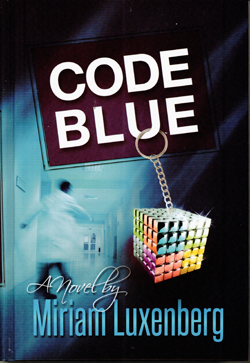Miriam Luxenberg, “Code Blue,” Jerusalem Publications, 2013, ISBN, 978-0-9888958-3-6, 208 pages
By Donald H. Harrison


SAN DIEGO — There are two major ethical dilemmas presented in this novel. In the first, a mother gives birth and doctors say her child is irreparably brain damaged. They want to take the little boy off life support. Elsewhere a woman who has dieted down to a Size 8 is considering undergoing surgery to get a lap belt, which will keep her thin. She doesn’t really want the surgery, but she is 35 years old, and her almost fiancé says unless she has the procedure, he won’t marry her.
Amid all this medical and spiritual tumult, there are intellectual conflicts between Orthodox Jews (who in the main are the protagonists) and secular Jews, who are the antagonists. But of course, for secular Jews, there is always hope. They’re Jews after all.
The mother who refuses to give up on the life of her child is sustained by the faith of her husband, a rabbi, who is not rattled in this crisis nor in any other. Every child is a gift from God, and one doesn’t reject Divine gifts. What will become of the child? HaShem will provide the answers when He is ready.
That he and his wife can be so sanguine in their beliefs and so steadfast in their refusal to follow medical advice infuriates a doctor, who is technically brilliant, but completely out of touch with the Jewish religion to which he was born.
This prompts the doctor to begin a dialogue about God and belief with the rabbi.
Meanwhile, as the marriageable, formerly overweight woman considers her course of action, she is interviewed by another secular Jew, a female journalist who like her is worried about her biological clock. Although the journalists thinks Orthodox Jews live by the precepts of a bygone century, she is impressed by her interviewee, whose faith in God remains undiminished even as her faith in man (particularly that man) is sorely tested.
I won’t tell you how, except to say it’s probably not as you think, that fate — or should I say HaShem– intervenes. Or perhaps the intervention came from Luxenberg, who as the creator of the plot and the characters, enjoys a certain omniscience.
*
Harrison is editor of San Diego Jewish World. He may be contacted via donald.harrison@sdjewishworld.com